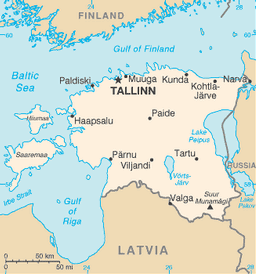Estonia
 Estonia is country of Europe located in central Europe.
Estonia is country of Europe located in central Europe.
Details
| Official Name: | Republic of Estonia |
| Capital: | Tallinn |
| Total area: | 45 227 km2 |
| GDP per capita: | $21,713 |
| Native Language: | Estonian |
| Government: | Parliamentary republic |
| Population: | 1,286,540 |
| Major Religion: | Irreligion, Evangelical Lutheranism |
| Monetary Unit: | Euro (EUR) |
Estonia, the most northerly of the Baltic states, regained its independence from the Soviet Union in 1991. It is a mainly flat country on the eastern shores of the Baltic Sea, with many lakes and islands. Much of the land is farmed or forested.
The Estonian language is closely related to Finnish, but bears no resemblance to the languages of the other Baltic republics, Latvia and Lithuania, or to Russian. About one quarter of the population is of Russian-speaking origin.
The capital, Tallinn, is one of the best-preserved mediaeval cities in Europe, and tourism accounts for 15% of Estonian GDP. The economy is driven by engineering, food products, metals, chemicals and wood products.
Throughout history, many other nations that ruled the region – Danes, Germans, Swedes, Poles and Russians – have influenced Estonian cuisine. Among the traditional dishes are marinated eel, blood sausage and sauerkraut stew with pork.
Famous Estonians include the writer Jaan Kross whose work has been translated into at least 20 languages, the author of the national epic (Kalevipoeg) Friedrich Reinhold Kreutzwald, and the writer, film-maker, diplomat and politician Lennart Meri.
Health & Welfare
Government pays national health care, child support, and pension.
Economy & Jobs
Industry, trade, and tourism.
Main Attractions
Hiiumaa island, Lahemaa National Park, and Saaremaa island.
Economy
As a member of the European Union, Estonia is considered a high-income economy by the World Bank. The country is ranked 16th in the 2012 Index of Economic Freedom, with the freest economy in Eastern Europe and the former Soviet Union. Because of its rapid growth, Estonia has often been described as a Baltic Tiger. Beginning 1 January 2011, Estonia adopted the euro and became the 17th eurozone member state.
According to Eurostat, Estonia had the lowest ratio of government debt to GDP among EU countries at 6.7% at the end of 2010. The world media has lately started to describe Estonia as a Nordic country, emphasizing the economic, political and cultural differences between Estonia and its less successful Baltic neighbours.
A balanced budget, almost non-existent public debt, flat-rate income tax, free trade regime, competitive commercial banking sector, innovative e-Services and even mobile-based services are all hallmarks of Estonia's market economy.
Immigration and residency
If you are interested in moving to the countries, either with a residence permit or by acquiring a citizenship, please contact us, and also get acquainted with the relevant migration documents.